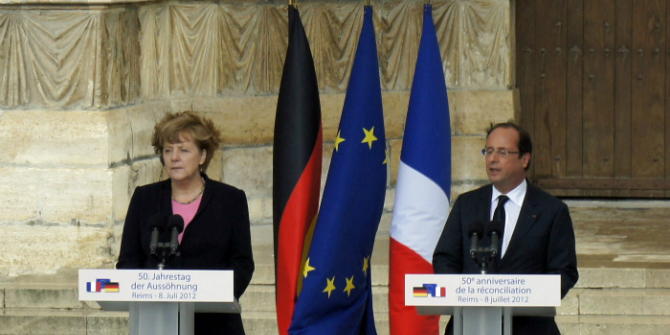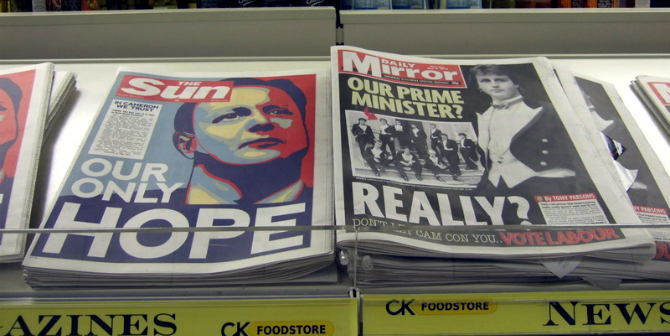
 The announced timing with respect to Article 50 will likely deprive Theresa May’s government of the valuable negotiation time and substantially diminish her bargaining power with the EU27. Mareike Kleine and Clement Minaudier make this argument on the basis of their research which shows that international negotiations falter when there are pending elections on the national level.
The announced timing with respect to Article 50 will likely deprive Theresa May’s government of the valuable negotiation time and substantially diminish her bargaining power with the EU27. Mareike Kleine and Clement Minaudier make this argument on the basis of their research which shows that international negotiations falter when there are pending elections on the national level.
This weekend, at the Conservative Party’s annual conference, Prime Minister Theresa May announced that in March 2017 her government will officially notify its European partners of the United Kingdom’s intention to withdraw from the European Union by 2019. This notification will trigger Article 50 of the Treaty on European Union that starts a two-year countdown until the negotiations have to come to a conclusion. In the case of a failure to reach any kind of agreement on the term of withdrawal, as well as on the future relationship between both partners, the EU’s treaties will cease to apply to the UK. At this point, it will lose special access to both the Single Market and the various Preferential Trade Agreements that the EU has struck with several dozen countries. Considering the tasks ahead, the UK is under a lot of pressure to successfully conclude the negotiations in a very short time.
There are plenty of reasons why the decision to pursue the ‘Brexit,’ be it in its ‘soft’ or ‘hard’ version, can be considered unwise. There are also doubts whether the British government has the institutional capacity and expertise to conduct what will be tremendously complex negotiations. Tactically, it seems very risky to plunge into the Brexit negotiations without securing any guarantee for a potential extension of the talks or a default interim agreement (paywall).
In light of our research, we are especially puzzled by the ill-chosen timing of the start of the Brexit negotiations, which would begin shortly before the French presidential and legislative elections (between April and June 2017) and the German federal elections in the autumn of the same year. This specific timing will likely cost the UK government several months of valuable negotiation time that, given the lack of an attractive default outcome and the already short time frame, will only diminish its bargaining power.
In a forthcoming article in the British Journal of Political Science, we explore to what extent pending elections in one of the member states impede the conclusion of negotiations at the EU level. The effect is surprisingly strong. In the case of elections to the German Bundestag, for example, the chances of reaching an agreement at the EU level in the three months prior to Election Day can fall by as much as sixty percent.
One potential explanation for why EU politics “freezes” as one or more governments are up for reelection has to do with the fact that governments fear that their message to the voter be contradicted by the decisions they take at the EU level. When the electoral race is tight and every vote counts, the government will be keen to avoid any negotiation stance that would cast doubts on its domestic electoral programme. This matters, even more, when the country having the election is a large member state whose position is of crucial importance to the agreement.
In light of our findings, we conclude that any progress in the Brexit talks is unlikely for the better half of 2017. In Germany, the ruling coalition will have to defend its controversial refugee policy. At the same time, it cannot afford to convey the impression that it is willing to compromise on the quite popular intra-EU migration (Eurobarometer 85). In both Germany and France, the established parties are keen to signal to the voters that populism does not pay off. Although the French electoral campaign is likely to revolve around the issue of extra-EU migration, the left and centrist candidates will seek to refute the argument of the right-wing Front National that a French exit is worth contemplating at all. Of course, the Brexit negotiations will take place behind closed doors, but it seems unlikely the negotiating partners could ever manage to keep the talks truly secret. The best option for the French and the German government during the Brexit talks is therefore not to voice any position on the future status of the EU-UK relationship at all. The negotiations will not get off the ground as a consequence.
In short, Theresa May’s decision to trigger Article 50 by March 2017 seems unwise. The timing will rob her government of valuable negotiation time and substantially diminish her bargaining power in the process.
This post represents the views of the author and not those of the Brexit blog, nor the LSE. Image credit: CC BY-SA 3.0
Mareike Kleine is Associate Professor of EU and International Politics at the LSE European Institute. @kleine_m
Clement Minaudier is a PhD student in the department of economics at the LSE.








Any time for Article 50 is unwise. Britain should seek EFTA membership first, Table as much acquis achievenets as CoE.treaty proposals.
I don’t agree with this sad, bitter obvious Emainer project fear negative opinion.
The EU is going to be in the most difficult position. Parties wanting to win national elections will absolutely have to come up with a Brexit negotiation strategy. The existing incumbents may want to avoid anything that reduces their chances of forming another govt but opposition parties will see an obvious opportunity to put pressure on them by announcing their strategy which may favour the UK.
Certainly some parties will advance their own position of opposition to EU laws and policies. Some may favour referendums, immigration control and a loosening of Brussels powers over their own sovereign states.
Should new governments form with new EU policies of their own they may be more willing to give the UK flexibility so they can show their electorate there is no need to fear implosion of their economies and countries if they leave.
A new settlement for all. A new Europe with trade agreements and common goals but without giving up their sovereignty. Thats my stance.
If the UK had gone in with Article 50 on the day after the referendum under Cameron, they might have had a chnce at a pssable deal.
As things now stand they have alienated just about all the 27. I doubt if the electorates in France and Germany would see anything wrong in the EU giving the UK a very hard time indeed.
There will never be an optimum time to trigger Article 50. Local, regional, national and European elections will always be happening in some part or other of a complex body of 28 members. Better to grasp the nettle now, and everybody to make their best effort, irrespective of external factors. I agree this is somewhat utopian, but it is less so than waiting for some imagined nirvana to suddenly appear.